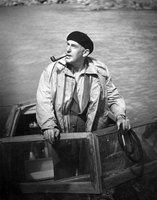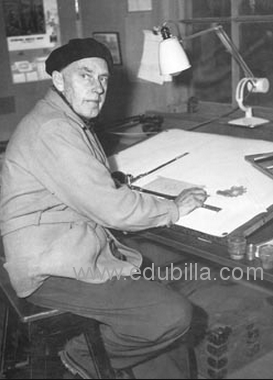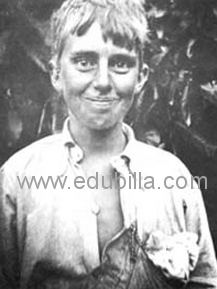










Sir Charles William "Bill" Feilden Hamilton OBE (26 July 1899 – 30 March 1978) was a New Zealander who developed the modern jetboat, and founder of what is now the world's leading water jet manufacturing company - CWF Hamilton Ltd.
Hamilton never claimed to have invented the jet boat. He once said "I do not claim to have invented marine jet propulsion. The honour belongs to a gentleman named Archimedes, who lived some years ago." What he did was refine the design enough to produce the first useful modern jet boat.
Early Life
Charles William Feilden Hamilton was born at Ashwick Station near Fairlie (South Island, New Zealand) on July 26, 1899. He was educated at Waihi School, Winchester, and later at Christ's College, Christchurch. But it was to Ashwick that he owed the education that encouraged his naturally inventive mind. The land provided him with the opportunity to best exploit his unique style of mechanical genius.
In 1921 Bill Hamilton bought the 10,000 hectare Irishman Creek Station, one of the most notable sheep and cattle runs in the Mackenzie Country (Central Otago). Here he quickly established his first workshop - forerunner to the Hamilton Group of Companies.
His first project was the construction of a two hectare dam for a hydro-electric plant to provide power for the station's homestead and workshop. Conventional earth moving scoops proved inadequate so, in typical Hamilton fashion, he invented his own more efficient model. This scoop, the "I.C. Excavator", was used extensively for local contract work, with several more being manufactured and sold in New Zealand and Britain.
Essentially a self-taught engineer, Sir William spent countless evenings at his drawing board doodling and designing. While he approached problems in an unorthodox way, he always produced machines consistent with the best engineering practices.
The Irishman Creek workshop also became an important machining and engineering training facility during the Second World War. Here Sir William taught many unskilled men to do high-precision work, with the workshop producing munitions as well as earthmoving equipment.
Towards the end of the war, Sir William was required to make one of the most crucial decisions of his life. The increasing demand for agricultural and earthmoving equipment and machinery presented him with the choice of working within the limitations imposed at Irishman Creek, or expanding. Never one to ignore a challenge, he decided to rent a small works building in Bath Street, Christchurch and match the keen demand for his machines.
Steady expansion continued, and in 1948 Sir William purchased a 10 hectare site at Middleton, Christchurch. A 465 square meter factory was constructed for the production of bulldozers, scrapers, excavators and hydraulic machinery.
Later Life
The shift to Christchurch allowed the Irishman Creek workshop to become solely a research and development centre. This provided the opportunity to devote resources to the development of the Hamilton Waterjet. Sir William's first jetboat was a 3.6 meter (12 foot) plywood hull with a 100 E Ford engine, and the jet a centrifugal type pump. This craft was tested on the Irishman Creek dam and water race before successfully, if somewhat slowly, travelling up the Waitaki River in early 1954. From then on Sir William and his team gradually improved the design of the waterjet, adding greater efficiency, power and speed.
Continual improvements in the waterjet design, particularly the shift to a multi-stage axial flow pumping system, allowed boats to travel to places that had never been accessible before. In 1960, Sir William's son Jon was a key member of the Colorado River expedition team - the first to travel up through the Grand Canyon. Over the next 20 years other ground-breaking trips were made up the Sun Kosi (Nepal), Sepik (Papua New Guinea), Zaire, Ganges and Amazon Rivers, and jetboats became widely used for flood relief, surveying and recreation.
Before his death in 1978, Bill Hamilton was recognised for his services to manufacturing with a knighthood. In 1990 he was inducted into the New Zealand Sports Hall of Fame, and in 2004 he was inducted into the New Zealand Business Hall of Fame.
In the 1961 New Year Honours Hamilton was appointed an Officer of the Order of the British Empire for services to engineering.In the 1974 Queen's Birthday Honours he was appointed a Knight Bachelor for services to manufacturing.

